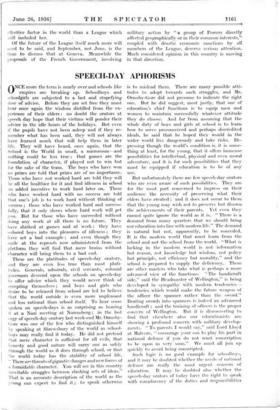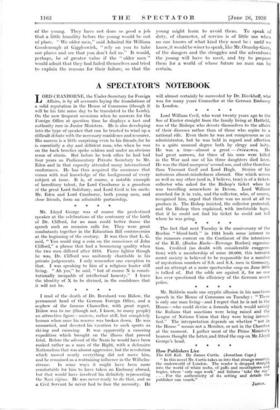SPEECII-DAY APHORISMS
ONCE more the term is nearly over and schools like empires are breaking up. Schoolboys and schoolgirls are subjected to a last and stupefying (lose of advice. Before they are set free they must hear once again the wisdom distilled from the ex- perience of their elders : no doubt the orators at speech day. hope that their victims will ponder their advice in the idle hours of the holidays. But even if the pupils have not .been asleep and if they re- member what has been said, they will not always have learned much that will help them in later life. They will have heard, once again, that the School is the World in small, a microcosm—and nothing could be less true ; that games are the foundation of character, if played not to win but for the sake of the team. The boys who have won no prizes are told that prizes are of no importance. Those who have not worked hard are told they will be all the healthier for it and find idleness in school an added incentive to work hard later on. Those who have worked hard with no success are told that one's job is to work hard without thinking of success.; those who have worked hard and success- fully, that it only shows where hard work will get you. But for those who have succeeded without doing any work at all there is . no future. They have, shirked at games and at work ; they have seduced boys into the pleasures of idleness ; they have set a bad example ; and even though they smile at the reproofs now administered from the platform they will find that mere brains without character will bring them to a bad end.
These are the platitudes of speech-day oratory, and they are even less true than most plati- tudes. Generals,. admirals, civil servants, colonial governors descend upon the schools on speech-day to offer advice which they would never think of accepting themselves ; and boys and girls who desire to be released from school are led to believe that the world outside is even more unpleasant and less rational than school itself. To hear sense spoken dri speech-days is as surprising as hearing it at a Nazi meeting at Nuremberg ; in the last orgy of speech-day oratory last week-end Mr. Ormsby- Gore was one of the few who distinguished himself by speaking at Shrewsbury of the world as school- boys may really find it today. He did not pretend that mere character is sufficient for all evils, that honesty and good nature will carry one as safely through the world as it does through school, or that the world today has the stability of school life. " There an threats of gigantic changes and new forces of a formidable character. You will see in this country inevitable struggles between clashing sets of ideas." That is an accurate description of the world as the young can expect to . find it ;. to speak otherwise is to mislead them. There are many possible atti- tudes to adopt towards such struggles, and Mr.
Ormsby-Gore did not presume to indicate the right one. But he did suggest, most justly, that one of education's chief functions is to equip men and women to maintain successfully whatever attitude they do choose. And far from assuming that the whole duty of boys and girls at school is to learn how to serve preconceived and perhaps discredited ideals, he said that he hoped they would in the wider world live dangerously and take risks. De- pressing though the world's condition is, it is some- thing at least, for the young, that it offers immense possibilities for intellectual, physical and even moral adventure, and it is for such possibilities that they must be equipped if education is to be of any use.
But unfortunately there are few speech-day orators who are even aware of such possibilities. They are for the most part concerned to impress on their audience the necessity of preserving what their elders have created ; and it does not occur to them that the young may wish not to preserve but disown the achievements of their parents. Yet even they cannot quite ignore the world as it is. " There is a demand from many quarters that we should bring our education into line with modern life." The demand is natural but not, apparently, to be conceded. It is the modern world that must learn from the school and not the school from the world. "What is lacking in the modern world is not information but reason, not knowledge but wisdom, not policy but principle, not efficiency but morality," and the school is prepared to supply the deficiency. There are other masters who take what is perhaps a more advanced view of the functions. "The handicraft side," said the Headmaster of Wellington," is being developed in sympathy with modern tendencies— tendencies which would make the future weapon of the officer the spanner rather than the sword." Beating swords into spanners is indeed an advanced handicraft ; and the training of officers is the proper concern of Wellington. But it is disconcerting to find that elsewhere also our educationists arc showing a profound concern with military develop- ments. " To parents I would say," said Lord Lloyd at Malvern, " encourage your son to play his part in national defence if you do not want conscription to be upon us very soon." We must all join up quickly to avoid being conscripted.
Such logic is no good example for schoolboys, and it may be doubted whether the needs of national defence are really the most urgent concern of education. It may be doubted also whether the speech-day orators of today have the right to speak with complacency of the duties and responsibilities of the young. They have not done so good a job that a little humility before the young would be out of place. " We older men," said Admiral Sir William Goodenough at Giggleswick, " rely on you to take our places and see that you don't fail us." It would, perhaps, be of greater value if the " older men " would admit that they had failed themselves and tried to explain the reasons for their failure, so that the young might learn to avoid them. To speak of duty, of character, of service is of little use when no one knows of what kind they must be : until we know, it would be wiser to speak, like Mr. Ormsby-Gore, of the dangers and the struggles and the adventures the young will have to meet, and try to prepare them for a world of whose future no man can be certain.











































 Previous page
Previous page